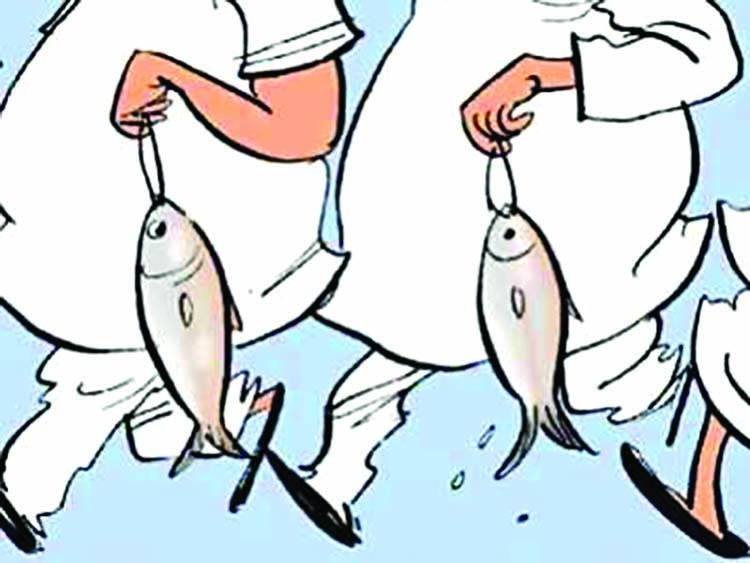Published: 12:54 AM, 19 December 2019
The Bengali and his ilish ...

Not many of us are quite familiar with the reality, which is that diplomacy is often dependent on what gastronomic delights are on offer. Now take this small matter of fish, in this instance the sweet water fish Bengalis on both sides of the political divide call ilish. To be sure, the term we use for it in English is hilsa.
And every time you refer to ilish or hilsa before a Bengali these days, you are quite likely to hear a sigh well up from somewhere deep within him. And when the sighing ends, as it must at some point, he will inform you, in none too happy an expression, that the fish these days is as good as extinct for people like him.
And there are a couple of reasons why it is so. In the first place, hilsa catches have been getting increasingly depleted in such rivers of Bangladesh as the Padma, Meghna and Jamuna. In the second, which is basically related to the first, prices of the fish have gone up horrendously. And the gourmand here? He simply hits the ceiling.
Which takes us back to the question of diplomacy and gastronomy. Bengali importers of the hilsa, in Kolkata, were outraged when not long ago the other Bengalis on the other side of the frontier --- or their government to be precise --- decreed that all exports of hilsa to India and to other places around the world would come under an immediate ban.
The Muslim holy month of Ramadan came in handy, for the Dhaka authorities were not quite willing to have the faithful, those engaged in fasting and prayer during the month, go without the taste of a fish the very scent of which, as it is being cooked, makes you drool.
Ramadan has come and gone, more than once, but the taste and smell of hilsa yet remains, almost like aroma, in Bengali homes in Bangladesh. Over there in West Bengal, even as Mamata Banerjee's politics keeps throwing up increasingly newer sparks everyday, this right of all Bengalis to partake of the hilsa is being asserted day in and day out.
Flustered fish importers in West Bengal made it known that they expected hilsa exports from Bangladesh to resume. For good measure, they also made it known that were the Bangladesh authorities to stick to such arbitrary behaviour by refusing to let the delectable hilsa place itself on dining tables all across West Bengal, the Kolkata fish wallahs would be compelled to send their own fish to Bangladesh.
And there you have it, this whole edifice of Bengali cultural unity (despite all that horror attendant on partition all those miserable decades ago) about to come tumbling down on the issue of the ilish. Bengalis are passionate people and nowhere is this truth more evident than in their deep-rooted attraction to poetry and politics.
Have two Bengalis sit across each other and chances are they will move straight to Tagore and Buddhadeva Basu or to Subhas Chandra Bose and Sheikh Mujibur Rahman. That is just as well. But then, do not forget this third factor which keeps injecting passion into Bengali lives. Yes, it is the hilsa, the ilish, which has been part of heritage for all Bengalis.
Housewives make a cooking of the fish a veritable celebration. You will have Bengali women tell you of the flavour that is to be had in a dish called shorshe ilish, hilsa cooked with a dash of mustard. It matters little whether you are in Dhaka or Kolkata, the ilish follows you. Or you make sure it does not go out of your sight. Ah, you are almost at the gateway to paradise!
Now, Bengalis in West Bengal, who generally consume anywhere between 60 and 70 metric tones of hilsa a day, wanted in that long ago season the embargo on the export of the fish to end now that Ramadan was over. And that was a thought which cheered fish exporters in Bangladesh, for they too had been feeling rather morose about the economic losses accruing from the banning move by the government. And it all stood to reason, for the figures said it all. Bangladesh exported as many as 5,376 tons of hilsa to India in 2011.
Considering that the totality of the exports amounted to 8,500 metric tons (those extra tons went to Europe and beyond), the figures for India were but a small hint of the ways in which the ilish continues to tempt the Bengali in West Bengal. Yes, but that ban?
You sense diplomacy coming in here, assuming that the Bengalis of Bangladesh were really not willing to have their hilsa begin going back to their compatriots in West Bengal.
But, sshh! Don't ignore the Bengali, here in a remote village in Bangladesh, who might ask you a pretty uncomfortable question: how is it that he often finds it hard to come by his silver-coloured ilish or, when he does come across it, must pay through the nose for his family to have it on the table?
Then might come another query: how does the Bengali on the other side of the divide get to have the hilsa from the Padma or Meghna cheap even as prices hit the roof on this side, the eastern part of what once was a united Bengal?
As you mull the responses to those questions, feel the smell of frying hilsa wafting across the timeless Bengali village in the twilight of a Bhadra day. Delight is in the air.
The writer is Editor- in -Charge of
The Asian Age
The writer is Editor- in -Charge of
The Asian Age




